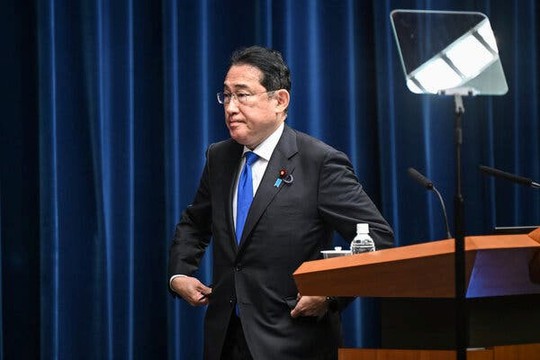Prime Minister Fumio Kishida of Japan with pockets empty of achievements.
Photo: NYT
When Prime Minister Fumio Kishida of Japan stepped down on Wednesday, he became the latest in a growing line of unpopular leaders to cycle through a sclerotic political system that has faced growing frustration from the public, writes ‘The New York Times’.
Mr. Kishida, 67, announced at a news conference that he would not run in the governing Liberal Democratic Party’s leadership contest in September, the winner of which will go on to become the prime minister.
Mr. Kishida, a moderate party stalwart, was not popular even when he first took office in October 2021, and in recent months his approval ratings have plummeted to new lows.
But for all that, even though polls have revealed the Japanese public’s deep discontent with the governing party, it only rarely appears at the ballot box. Low voter turnout and weak political opposition in Japan have left the Liberal Democratic Party largely insulated from the pressure of potentially losing a general election.
Mr. Kishida said on Wednesday that he hoped his decision would enable the Liberal Democrats to make a big change.
But whether the governing party’s elite power brokers are finally ready to choose a candidate able and willing to bring any notable change — after years of resisting that pressure — is a huge question hanging over Japan in the next month.
In recent months, Mr. Kishida has seen his ratings slide in response to yet another scandal that emerged involving prominent lawmakers within the Liberal Democratic Party. His reputation has also soured over rising prices that have put pressure on households and Japan’s broader economy.
Political analysts said Mr. Kishida’s reputation suffered because he was viewed as a leader unable to offer bold solutions to problems such as Japan’s rapidly declining population, tepid economy and ballooning levels of debt. On the domestic front, Mr. Kishida has largely maintained the governing party’s longstanding economic policies, though they have failed to relieve the country’s stagnation.
Despite being in office for just less than three years, Mr. Kishida has become Japan’s eighth-longest-serving prime minister. Now, his resignation is reviving concerns within Japan that the country may return to the revolving door of prime ministers that has long characterized its political landscape.
The challenge for the next Liberal Democratic Party leader will be to deal with political uncertainty abroad — particularly within the United States — and to promote policies domestically that will help gain the backing of the Japanese people, said Ken Jimbo, a professor of international politics and security at Keio University.
Earlier this year, Mr. Kishida dissolved his own faction within the Liberal Democrats over a scandal involving campaign funds. The faction was found to have failed to officially report the equivalent of hundreds of thousands of dollars’ worth of political contributions. Other ruling-party factions failed to report even bigger sums.
A poll last week by NHK, the public broadcaster, found that Mr. Kishida had an approval rating of just 25 percent, down from around 50 percent when he ascended to the role.
Mr. Kishida came into office in 2021, after a year in which voters had grown increasingly frustrated with the government’s handling of the pandemic and associated economic woes. He responded to public concerns by pledging to introduce “a new capitalism” and to encourage companies to distribute more of their profits to workers.
As Mr. Kishida’s popularity sank to new lows in recent months, the Liberal Democratic Party has been searching for a potential successor.
Mr. Kishida said Wednesday that whomever the Liberal Democratic Party selected as its next leader would face “domestic and international difficulties that are truly severe.”
read more in our Telegram-channel https://t.me/The_International_Affairs

 12:18 15.08.2024 •
12:18 15.08.2024 •























